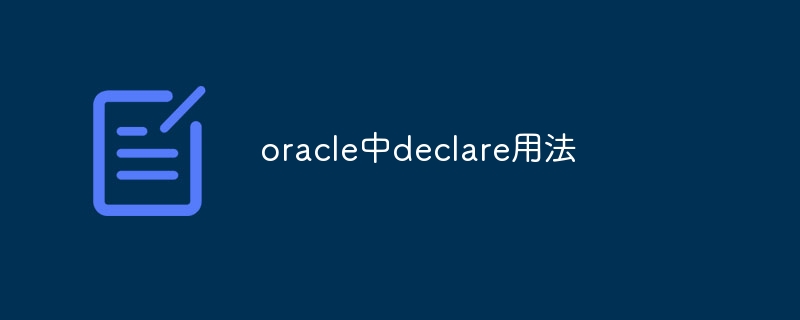How to use declare in oracle
- 下次还敢Original
- 2024-05-03 00:18:51716browse
The DECLARE statement in Oracle declares objects such as variables, constants, and cursors. The syntax is: DECLARE [modifier] identifier data type [DEFAULT default value] [, ...], used to store temporary data, multiple reference values, or process cursors.

DECLARE Usage in Oracle
The DECLARE statement is used to declare variables and constants in Oracle PL/SQL blocks , cursors, and other objects. The syntax is as follows:
<code>DECLARE [修饰符] 标识符 数据类型 [DEFAULT 默认值] [, ...]</code>
Among them:
- Modifier: Optional, specifies the visibility of the variable (LOCAL/GLOBAL).
- Identifier: The name of the variable or constant.
- Data type: The type of variable or constant (for example: NUMBER, VARCHAR2).
- DEFAULT: Optional, specifies the default value of the variable.
Example:
<code class="plsql">DECLARE v_number NUMBER(10); c_name VARCHAR2(50) := 'John Doe'; r_cursor SYS_REFCURSOR; BEGIN ... END;</code>
In the above example:
- v_number is a LOCAL variable used to store a 10 digits.
- c_name is a global constant used to store the string "John Doe".
- r_cursor is a cursor variable used to reference the result set of a SELECT statement.
Visibility of variables and constants:
- LOCAL: A variable can only be used within the block in which it is declared.
- GLOBAL: A variable can be used within the block in which it is declared and its nested blocks.
When to use DECLARE?
The DECLARE statement is usually used in the following situations:
- It is necessary to store temporary data (variables) in a PL/SQL block.
- Need to reference the same value (constant) multiple times in a block.
- Need to handle cursors in blocks.
The above is the detailed content of How to use declare in oracle. For more information, please follow other related articles on the PHP Chinese website!
Statement:
The content of this article is voluntarily contributed by netizens, and the copyright belongs to the original author. This site does not assume corresponding legal responsibility. If you find any content suspected of plagiarism or infringement, please contact admin@php.cn
Previous article:How to replace rownum in oracleNext article:How to replace rownum in oracle

